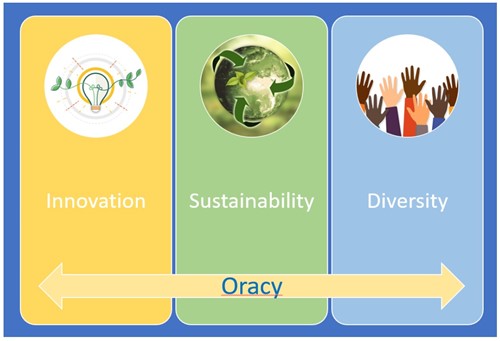Foundation Subjects
The basis of our curriculum is our vision and values.
Enriching lives everyday; enabling our school community to learn, achieve and flourish through living ‘life in all its fullness’
Our values .... Excellence, Nurture, Respect, Integrity, Compassion, Hope (ENRICH)
Our aim is to bring this in to everything that we do at St Peter’s Bratton and as the core of this is our curriculum.
In developing our curriculum outside of English of maths, we have gone beyond the officer of the National Curriculum and identified three areas that are pivotal to our learning. Each term, each foundation subject has innovation, sustainability and diversity as key drivers or ‘golden threads’ to our curriculum.
In addition to this, oracy is a key component of the curriculum and we teach children about oracy as well as how to use oracy. As our curriculum evolves, we will develop the oracy curriculum and the opportunities it represents further.

The reasons behind these golden threads are:
Sustainability:
Many have described the climate crisis as the number 1 issue in our society today. Indeed, Telford and Wrekin Council list climate change as their number 4 strategic priority in the vision. ‘Our natural environment is protected – we take a leading role in addressing the climate emergency.’. In order to tackle climate change, we must all play a part in living more sustainably, but in doing so need to understand the subtleties that can make a huge difference, as well as the big issues. Sustainability will continue to grow, impacting on all areas of our lives. How we run our homes, travel, what we eat. There are so many possibilities where children can learn about sustainability. Children need to know about sustainability for the future, as individuals, in the workplace and as the decision makers of the future.
Diversity:
Telford and Wrekin is statistically less diverse than the UK as a whole and certainly less diverse than nearby Birmingham. In order to develop an understanding of diversity and mutual respect of others views, values and faith, we believe it is important that diversity receives a high profile in our curriculum. As a trust, St Chad’s is in a unique position to demonstrate and embrace diversity with schools covering central Walsall, Stoke, Wolverhampton, right over to the Welsh border town of Oswestry and subtly weave this diversity throughout the curriculum and school life.
Innovation:
Telford and the surrounding area has a long history of innovation, from the industrial revolution through to modern day. Telford is incredibly rich in innovation history. Not only do we have industrial revolution history on our door step, but we have Roman innovation a few miles away.
Why Oracy?
The ability to talk and communicate, engage with others, react, laugh, show emotion, debate, appreciate a view point, ask a relevant question are all integral parts of what makes us the people we are. As a community and a society, so many issues and problems are solved by speaking and hearing another’s view point. Added to this, we captivate and engage people and audiences by speaking. The ability to speak to an audience, ask a question in front of a large group, listen to and respond appropriately will create future citizens who demonstrate the confidence, understanding and resilience to tackle a wide variety of problems and environments.
By identifying oracy as a key vehicle for the curriculum, we will cover the four interwoven oracy strands of: physical, cognitive, linguistic and social & emotional. We teach about oracy (how to speak correctly) and learn through oracy. This will increase our pupil’s confidence, articulacy and capacity to learn.
Practically speaking, routine aspects of school life have an oracy focus, enabling all children to practice their oracy in contexts outside of the classroom.
Subjects:
In National Curriculum Years (Years 1-6) each subject is taught as an individual subject, using appropriate specific subject techniques. This allows us to develop the depth of the curriculum and for children to understand the critically important knowledge for that subject. In most subjects, the curriculum has been entirely written by ourselves, using the National Curriculum as our basis and inspiration. In some subjects, we have used published schemes as an inspiration for our teaching and adapted them to suit our needs.
Where there are opportunities to make links between subjects teachers will take these opportunities and as our curriculum evolves, these inter-disciplinary links will grow and develop.
At the heart of all areas of our curriculum is reading. Our school library has been designed around our school curriculum and therefore high quality texts are a feature across the curriculum.
For each subject, school has developed a knowledge and skills continuum, identifying how the subject knowledge and skills build through the school. At the root of all subjects is the Early Years Foundation Stage, which prepares for all the National Curriculum subjects to come. For enquiries relating to an individual subject, please contact the school office, who will pass your enquiry to the appropriate member of staff.
Subject leaders have developed knowledge organisers which identify the critical learning for each subject, each term. Class teachers and subject specialists use these knowledge organisers to write the programme of learning for each year group each term. The knowledge organisers are shared on the website for the learning each term to be seen and they can be found using the subject links below. Each of the knowledge organisers has one of our golden threads as a driver for the subject and you can find these organised by subject below.
In addition to the National Curriculum subjects, RE and PSHE all year groups have experiences in Forest School every term and learn about oracy and how to use oracy successfully.
